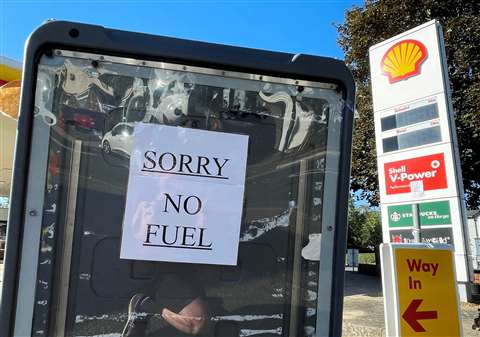NFB’s 5 ways government can tackle fuel issues
01 October 2021
With the lack of HGV drivers causing fuel shortages and massive delays across the UK, we speak to the National Federation of Builders on what the government must do to tackle issues facing the industry.
 The lack of HGV drivers has led to a sharp drop in fuel deliveries to petrol stations across the UK. Photo credit: Reuters.
The lack of HGV drivers has led to a sharp drop in fuel deliveries to petrol stations across the UK. Photo credit: Reuters.
For over a week much of the UK has been placed under extreme stress as the lack of HGV drivers continues to disrupt the delivery of fuel to petrol stations, causing long queues and delays around the country.
While transport secretary Grant Shapps admitted on Tuesday that the decision to leave the European Union (EU) had been “a factor” in the situation, Boris Johnson’s government - and the fuel industry at large - have been vocal in their attempts to stress that there is no actual lack of fuel.
As part of efforts to address the situation the Government has proposed a number of measures, such as training programmes and the issuing of temporary visas for HGV drivers. However, the implementation of these has been criticised as slow.
This has prompted a response from the UK’s National Federation of Builders, which is now calling on the Government to do more, saying that the proposed measures are not enough.
James Butcher, Head of Policy at the National Federation of Builders, said, “The announcement of just 5,000 visas will sadly go nowhere near tackling our current woes and will continue to impact the construction sector in terms of both availability and prices of materials.”
Speaking to Plantworx News, the trade association said that in order for the construction industry to cope with the crisis, five key actions must be taken to alleviate pressure on construction sector firms - both now and in the future.
5 ways construction can manage the fuel crisis
1. Government must deliver on its proposal to issue 5,000 temporary visas for foreign HGV drivers for 3 months
*The government has proposed this as part of its solution package, and while the visas were not available at the time of writing this article, they are now believed to have been introduced.
2. Expand temporary visa proposals for long-term gain
The NBF believes “tens of thousands” of HGV drivers will be required, and that the 5,000 temporary visas being offered by the Government are “nowhere near enough to tackle the current shortages” and is urging Ministers to go futher”.
James Butcher, Head of Policy at the National Federation of Builders, said, “The Government has long championed the benefits that an independent immigration system can bring. Now is the time to realise that flexibility and react to labour market needs by issuing many more short-term visas for the drivers we need.”
Likewise, trade associations in other sectors have also warned that this is not enough to meet demand.
The British Retail Consortium has said that the supermarket sector requires at least 15,000 drivers and the Road Hauliers Association (RHA) stated that the current shortage of people stands at around 100,000.
3. Government must address the rising cost of construction materials and products
These have skyrocketed for NFB members and the construction industry alike, with the materials price index running at a 20% increase in July 2021 based on the year before.
While the reasons for that inflation are multi-faceted, a contributing factor is the shortages in HGV drivers, which is further reducing supply and driving up the costs of transport.
The response to the worsening situation has culminated in the panic-buying of fuel, putting yet more pressure on the industry’s ability to access products and materials.
4. Work collaboratively with hauliers to remove entry barriers to the domestic industry
A broader policy point, according to the NFB some 28,000 drivers were lost as a result of the pandemic and Brexit, all of whom are believed to have returned to other parts of the EU.
With current complications around getting a visa making it harder to recruit drivers, the NFB is calling for more widespread changes to the visa system, which it says need to be met through consistent dialogue with the industry.
Butcher said, “To solve the shortages in the long term, the Government must also work collaboratively with the hauliers to ensure that the barriers to entry into the domestic industry are removed.”
5. Provide incentive schemes such as upfront funding of training in return for contractual commitment of service
This is the NBF’s potential answer to the longer-term issue and it has urged the government to use the fuel crisis to act immediately to address the problem.
With a lull in activity in the construction sector expected around Christmas, the issue could rear its head with the commencement of 2022.
“If we can incentivise drivers to train now, we stand a little bit of hope for them to get ready,” said Butcher.
“We like the up-front funding idea; it gives the applicant no cost to retrain and then contractually they are tied in for a few years meaning they will stay in the employment and providing some stability.
“The fuel crisis is a symptom of a wider problem facing the construction industry, not the problem itself. It has only happened because we have allowed the HGV driver issue to spiral out of control and the government has only begun to deliver an action plan to try and solve it.”
STAY CONNECTED



Receive the information you need when you need it through our world-leading magazines, newsletters and daily briefings.
CONNECT WITH THE TEAM







